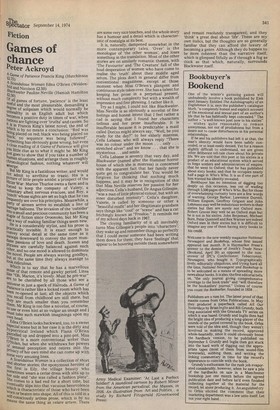Bookbuyer's
Bookend
One of the winter's guessing games will undoubtedly involve a book published by Elek next January. Entitled The Autobiography of an Englishman it is, says the publisher's catalogue blurb, "a completely honest and explicit account of the emotional and sexual part of an author's life that he has habitually kept concealed." The
• author — well-known poet now in his sixties" — wishes quite reasonably to remain anonymous, not out of prudishness but from a desire not to cause disturbances in his personal relationships. If he and his publishers had left it at that, the man's identity would have been safely concealed, or at least easily denied. Yet for a reason slightly difficult to understand, we are given other deliberate tell-tale clues about his private life. We are told that this poet in his sixties is a product of an educational system which served to forge soldiers and administrators of empire; that he went to Oxford; that he has published about sixty books; and that he occupies nearly half a page in Who's Who, It is as if one part of him wanted his identity revealed.
Bookbuyer has no intention of digging too deeply on this occasion, less yet of wading through 3,500 pages of Who's Who. But for those of overwhelming curiosity here are a few words of warning. George Barker, Lawrence Durrell, William Empson, Geoffrey Grigson and John Lehmann may well be industrious writers in their sixties but they are surely not Oxford men. Robert Graves may well be an Oxford man but he is not in his sixties. John Betjeman, Michael Burn, Peter Quennell and Rex Warner are indeed Oxford men in their sixties but it is difficult to imagine any one of them having sixty books to his credit.
Welcome to the new weekly magazine National Newsagent and Bookshop, whose first issued appeared last month. It is Haymarket Press's answer to the demise of Smith's Trade News (Bookend, April 20) as opposed to the nonanswer of IPC's Confectioner, Tobacconist, Newsagent, who bought it. Typographically lively, editorially ubiquitous, and trying hard all the time, National Newsagent and Bookshop is to be welcomed as a means of spreading more news about books. It is also, the first editorial tells' us, "the only journal giving comprehensive coverage to the book trade" and "will therefore be the booksellers' journal." Unless of course you count the Bookseller, founded in 1858 ...
Publishers are a rum lot. The latest proof of that maxim comes from Orbis Publications. In May they produced a paperback called All Our Yesterdays by Brian Inglis and Bill Grundy, both long associated with the Granada TV series on
which it was based. Grundy and Inglis then had the bright idea of producing a long-player of the sounds of the period covered by the book. Orbis
were told of the idea and, though they weren't involved in making the record, approved whole-heartedly, since it could obviously boost the hardback version, to be published on September 5. Grundy and Inglis then got stuck into the hard work of digging out the appropriate tapes (most of them from sound-film newsreels), subbing them, and writing the linking commentary in time for the record's appearance to coincide with the book.
Grundy's enthusiasm for the rush job evaporated considerably, however, when he saw a pile of the hardbacks on sale in a Manchester bookshop just one month before the agreed publication date and before he'd even finished collecting together all the material for the record, let alone producing it. An anguished cry to Orbis elicited the comment that their marketing department was a law unto itself. Let not your right hand . . .


































































 Previous page
Previous page